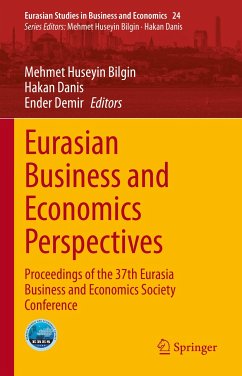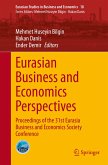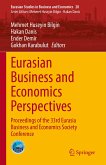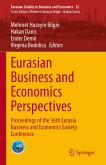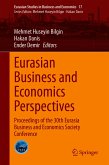Eurasian Business and Economics Perspectives (eBook, PDF)
Proceedings of the 37th Eurasia Business and Economics Society Conference
Redaktion: Bilgin, Mehmet Huseyin; Demir, Ender; Danis, Hakan


Alle Infos zum eBook verschenken

Eurasian Business and Economics Perspectives (eBook, PDF)
Proceedings of the 37th Eurasia Business and Economics Society Conference
Redaktion: Bilgin, Mehmet Huseyin; Demir, Ender; Danis, Hakan
- Format: PDF
- Merkliste
- Auf die Merkliste
- Bewerten Bewerten
- Teilen
- Produkt teilen
- Produkterinnerung
- Produkterinnerung

Hier können Sie sich einloggen

Bitte loggen Sie sich zunächst in Ihr Kundenkonto ein oder registrieren Sie sich bei bücher.de, um das eBook-Abo tolino select nutzen zu können.
EBES conferences have been intellectual hub for academic discussion in economics, finance, and business fields and provide network opportunities for participants to make long lasting academic cooperation. This is the 24th volume of the Eurasian Studies in Business and Economics (EBES's official proceeding series) which includes selected papers from the 37th EBES Conference - Berlin. The conference was jointly organized with the GLO (Global Labour Organization, a global, independent, non-partisan and non-governmental organization based in Germany) with the support of the Istanbul Economic…mehr
- Geräte: PC
- ohne Kopierschutz
- eBook Hilfe
- Größe: 10.11MB
![Eurasian Business and Economics Perspectives (eBook, PDF) Eurasian Business and Economics Perspectives (eBook, PDF)]() Eurasian Business and Economics Perspectives (eBook, PDF)113,95 €
Eurasian Business and Economics Perspectives (eBook, PDF)113,95 €![Eurasian Business and Economics Perspectives (eBook, PDF) Eurasian Business and Economics Perspectives (eBook, PDF)]() Eurasian Business and Economics Perspectives (eBook, PDF)121,95 €
Eurasian Business and Economics Perspectives (eBook, PDF)121,95 €![Eurasian Business and Economics Perspectives (eBook, PDF) Eurasian Business and Economics Perspectives (eBook, PDF)]() Eurasian Business and Economics Perspectives (eBook, PDF)113,95 €
Eurasian Business and Economics Perspectives (eBook, PDF)113,95 €![Eurasian Business and Economics Perspectives (eBook, PDF) Eurasian Business and Economics Perspectives (eBook, PDF)]() Eurasian Business and Economics Perspectives (eBook, PDF)161,95 €
Eurasian Business and Economics Perspectives (eBook, PDF)161,95 €![Eurasian Business and Economics Perspectives (eBook, PDF) Eurasian Business and Economics Perspectives (eBook, PDF)]() Eurasian Business and Economics Perspectives (eBook, PDF)113,95 €
Eurasian Business and Economics Perspectives (eBook, PDF)113,95 €![Eurasian Business and Economics Perspectives (eBook, PDF) Eurasian Business and Economics Perspectives (eBook, PDF)]() Eurasian Business and Economics Perspectives (eBook, PDF)178,95 €
Eurasian Business and Economics Perspectives (eBook, PDF)178,95 €![Eurasian Business and Economics Perspectives (eBook, PDF) Eurasian Business and Economics Perspectives (eBook, PDF)]() Eurasian Business and Economics Perspectives (eBook, PDF)161,95 €
Eurasian Business and Economics Perspectives (eBook, PDF)161,95 €-
-
-
Dieser Download kann aus rechtlichen Gründen nur mit Rechnungsadresse in A, B, BG, CY, CZ, D, DK, EW, E, FIN, F, GR, HR, H, IRL, I, LT, L, LR, M, NL, PL, P, R, S, SLO, SK ausgeliefert werden.
- Produktdetails
- Verlag: Springer Nature Switzerland
- Seitenzahl: 392
- Erscheinungstermin: 26. November 2022
- Englisch
- ISBN-13: 9783031155314
- Artikelnr.: 66681051
- Verlag: Springer Nature Switzerland
- Seitenzahl: 392
- Erscheinungstermin: 26. November 2022
- Englisch
- ISBN-13: 9783031155314
- Artikelnr.: 66681051
- Herstellerkennzeichnung Die Herstellerinformationen sind derzeit nicht verfügbar.
